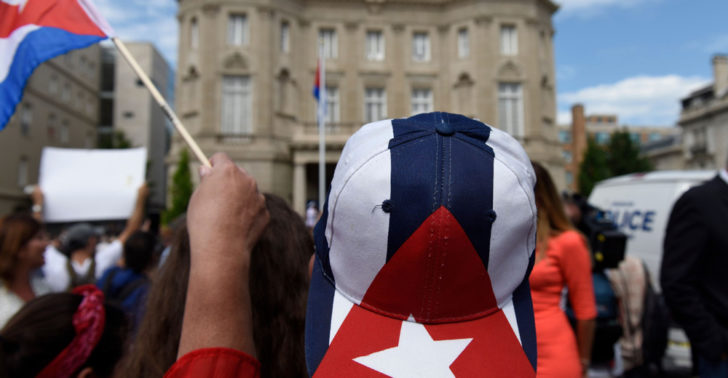
Cuba in the U.S. elections
HAVANA — So far, despite the tremendous media impact created by the reestablishment of relations, except for brief references in the platforms approved by each party, and an occasional comment by a presidential candidate, Cuba has not been a relevant issue in the current U.S. elections.
Although it is too soon to come to definitive conclusions and we cannot discount that the issue will become manifest in certain contexts, we see at least two reasons to predict that the situation will remain the same for the rest of the campaign.
On one hand, because it is not a determinant factor in the voters’ decision on a national level, and on the other hand because the process of reestablishing relations with Cuba has had such bipartisan support that a sharp clash between Democrats and Republicans is unlikely, especially in the case of the presidential candidates.
In reality, although it has not been generally perceived thus in Cuba, due to its domestic implications, the Cuban issue was not a priority in the agenda of U.S. politicians in previous elections either.
Therefore, what’s relevant in the current situation is not its relative importance but the brusque change that occurred in the approach to the issue.
Until now, the topic of Cuba appeared as an excuse to project the most intransigent positions on both sides, serving to label as “hardliners” even the most moderate candidates on other issues of foreign policy.
The equation was very simple. Advocating a different policy toward Cuba was an unjustifiable risk despite the electoral advantages it might entail. That explains both the similarity of the candidates’ discourse and the effectiveness of the Cuban-American far-right lobby, which acted without any counterweights on the U.S. political arena.
Sufficient it was to show up in Miami and proclaim a commitment to the overthrow of the Cuban regime to harvest the Cuban-American vote and, for minimal investment, to project an image of firmness in the confrontation with “the enemies of the United States.”
Generally, the Republican candidates won in these surroundings, because the so-called “historic exile” saw them as the most intent on applying the most hostile policies toward Cuba — even military intervention.
In 2008, Barack Obama broke with tradition and announced he would relax the restrictions on travel and remittances to Cuba imposed by the George W. Bush administration, adding that he would be willing to negotiate with the Cuban government. That served him well within the Cuban-American electorate, translating in 2012 into a margin of support that reached about 50 percent of the voters.
The reestablishment of relations with Cuba completed this process and at present the polls show that most Cuban-Americans, and the rest of the American voters, support that policy. This explains the convenience of amending the discourse and the fact that no great differences on the issue exist between the presidential candidates, although for reasons that are completely different from the past.
The Democratic platform and Hillary Clinton’s speech emphasized the continuity of this policy, and, although the Republican platform adopted a language that was contrary to it, it doesn’t seem that that is Donald Trump’s position. Trump has even been accused of exploring possibilities for doing business in Cuba, taking advantage of the new juncture.
Therefore, it is possible to predict that, at most, the Cuban issue will be raised by Clinton to underscore the Democrats’ success, to which Trump might respond that he could have done it much better, as he has said so far, without questioning the strategy.
In the case of the Congressional elections, we should hope that, in general, the Republicans will try to avoid the issue so as not to support Washington’s policy, inasmuch as in many agricultural districts (where Republicans enjoy a majority) the possibility of doing business with Cuba is of interest to large sectors of the GOP’s own electorate.
An exception will be found in some districts in South Florida, where the topic of Cuba is inevitable and significantly influences the behavior of Cuban-American voters.
Everything indicates that, despite the changes that have occurred in the Cuban-American electorate, the far-right’s local political machine, linked basically to the Republicans, has enough strength to reelect its representatives, who constitute the hard core of the opposition to Obama’s Cuba policy in the U.S. Congress.
Nevertheless, the simple fact that so far in these elections we see conflicting positions regarding relations with Cuba constitutes a significant change if we compare them with the monolithic bloc that existed in the past. It will be interesting to measure the margins that will emerge in these contests, with a view to evaluating the future behavior of the electorate.
In any case, there has been a change in the cost-benefit relationship that rules U.S. elections, and the more hostile positions against Cuba now must face very powerful counterweights, radically altering the balance of forces regarding the Cuban issue.
To Cuba, that constitutes the fundamental difference between these elections and past elections. It justifies us when we affirm that we are in the presence of an unprecedented scenario in the history of the two countries.


